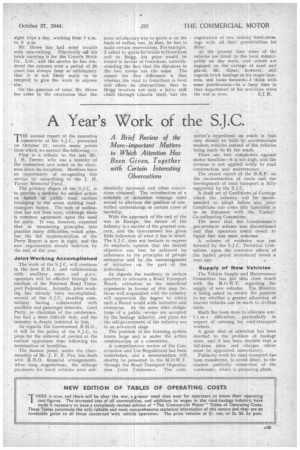A Year's Work of the SJ.C.
Page 31

If you've noticed an error in this article please click here to report it so we can fix it.
THE annual report of the executive commitiee of the S.J.C., presented on October 11, covers many points from which wa extract the following:—
First is a tribute to the late Mr. J. H. Turner, who was a founder of the committee and acted as its chairman since its inception. Members have an opportunity of recognizing this service by subscribing to the J. H. Turner Memorial Fund., The primary object of the S.J.C. is to provide a medium for unified action on laehalf of 'public road carriers belonging to -the seven existing roadtransport bodies. The task of unification has not been easy, although there is common agreement upon the need for unity. It was, however, expected that in translating principles into practice many difficulties would arise, but the full implementation of the Perry Report is now in sight, and the new organization should function by the end of the year.
Joint Working Accomplished The work of the S.J.C. will continue in the new R.H.A. and collaboration with ancillary users and p.s.v. operators will be effected through the medium of the National Road Transport Federation. Actually, joint work.. ing has already been accomplished, several of the S.J.C. standing committees having collaborated with ancillary and passenger interests. Lord Perry, as chairman of the conference, has had a most difficult task, and the industry is deeply indebted 'to him, As regards the Government R.H2O., it will be the policy of the S.J.C. to press for the removal of control at the earliest opportune time following the termination of hostilities.
The finance panel, under the chairmanship of Mr. J. F. E. Pye, has dealt with R.H.O. financial arrangements. After long negotiations, the mileage payments for hired vehicles were sub stantially increased and other concessions obtained. The introduction of a schedule of minimum tonnage rates served to alleviate the position of controlled undertakings in certain cases of hardship. .
With the approach of the end of the war in Europe, the future of the industry is a matter of the greatest concern, and the Government has given little indication of what it has in mind. The S.J.C. does not hesitate to express its emphatic opinion that the desired objective can best he achieved by adherence to the principles of private enterprise and by the encouragement of initiative on the part of the individual.
As regards the tendency in certain quarters to advocate a Road Transport Board, attractive as the superficial arguments ha favour of this may be, those well acquainted with the industry will appreciate the degree to which such a Board would stifle initiative and enterprise. At the same time obligations of a public rervice are accepted by the haulage industry. and plans for the self-government of the industry are in an advanced stage.
The problem of the licensing system looms large and is under the active consideration of a committee.
A comprehensive review of the Con. struction and Use Regulations has been undertaken, and a memorandum will shortly be presented to the M.O.W.T. through the Road Transport Organization Joint Conference. The corn
inittee's hypothesis on roads is that they should be built to accommodate modern vehicles instead of the vehicles being made to fit the roads.
There are two complaints against motor taxation—it is too high, and the revenue is not applied solely to road construction and maintenance.
The recent report of the B.R.F. on the reconstruction of roads and the development of road transport is fully supported by the S.J.C.
A draft set of Conditions of Carriage which the industry will be recommended to 4clopt before any, joint Conditions can come into operation is to be discussed with the Traders' Co-ordinating Committee.
The news that the Government's gas-producer scheme was discontinued and that operators could revert to liquid fuel was most welcome.
A volume of evidence was put forward by the S.J.C. Technical Committee, upon the corrosive effects of the leaded petrol introduced about a year ago. • Supply of New Vehicles The Vehicle Supply and Maintenance Committee has got into close touch with the M.O.W.T. regarding 'the supply of new vehicles. The Ministry is being asked to review the position to see whether a greater allocation of heavier vehicles can be made to civilian users.
Much has been done to alleviate wartime difficulties, particularly in respect of catering for road-transport workers.
A great deal of attention has been devoted to the problem of haulage rates, and it has been decided that a full-time rates and charges officer must be appointed immediately.
Publicity work for road transport has been transferred, to avoid delay, to the shadow publicity committee of the conference, which is preparing plans.




















































